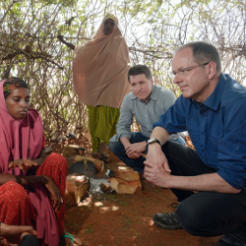Charities should approach corporate partnerships as “critical friends” if they are going to change business practices for the better, the audience at a launch event for C&E Advisory’s latest Corporate-NGO Partnerships Barometer heard.
The panel discussion in London yesterday brought together heads of corporate responsibility and partnership fundraisers from leading charities, including those representing the ‘most admired’ partnerships set out in C&E’s 2014 barometer.
Based on a survey of 130 charities and companies, the report asked respondents about which partnership they most admire, with Oxfam and Marks & Spencer coming out top, followed by Boots and Macmillan Cancer Support, and Save the Children and GSK.
There was broad agreement that charities needed to be more commercially-minded in their approach to corporate partnerships, but also that they should challenge companies to do better.
Rachel Wilshaw, ethical trade manager at Oxfam, said the sustainable shopping campaign with M&S Shwopping has been a “win-win for both organisations”.
She said in the 1990s she had worked on Oxfam’s fair trade programme, which included lobbying companies including M&S and developing standards for fair trade.
“I think with all corporate partnerships there is always the element of being a critical friend that challenges the company about its practices,” she said. “It is not just commercial and not just two brands getting together and doing stuff.
“It is about getting the balance right and in a lot of successful partnerships there is that element of being a critical friend.”
According to the report, 87 per cent of corporates said their NGO partners had helped improve their understanding of social and/or environmental issue. It showed that 59 per cent of companies said their partners have helped change their business practices for the better.
'Due diligence and risk assessment is crucial'
Douglas Rouse, director of corporate partnerships at Save the Children, answered a question from event chair Manny Amadi, chief executive of C&E, about the challenges of working with a big pharma company and a sector that is “not universally loved”.
“It is not just with big pharma, with all companies due diligence and risk assessment is crucial,” Rouse said. “For all the companies we work with we have a separate area, outside of fundraising, which looks at risk assessment. We run live Q&As with partners, it is about being very open and honest and transparent. Companies make mistakes and so do we.”
He said Save had been working with GSK since 2008, before the new five-year partnership was launched last year. GSK employees are aiming to raise £1m a year, which will be matched by GSK. The company has pledged to donate at least £15m over the course of the partnership and will contribute through specific research and development programmes.
Rouse said GSK was a "changed company" since Sir Andrew Witty (pictured with Save chief executive Justin Forsyth) became chief executive in 2008. Save invited all its staff to presentations about the partnership and it was improved by the charity’s global board of directors and trustees.
“I think it is an amazing partnership the way companies are moving,” he said. “The money is substantial but quite small compared to the overall impact of the partnership.”
The charity and the company have a joint research and development board working to tackle causes of newborn and infant death.
Save representatives found that GSK had an agent in its mouthwash that could be used as a gel to seal umbilical cords to prevent infections and save the lives of newborns.
Corporate members of the panel were asked what their advice would be for charities wanting to partner with them. Rebecca Marmot, global partnerships and foundation director at Unilever, said: “Demonstrate how there is a really strong business case for doing it.”
Adam Elman, global head of Plan A at M&S, added: “Be realistic. We always like to challenge ourselves but it has to be within the realms of what can be achieved. Have some steps we can take towards achieving it that sound sensible.”









